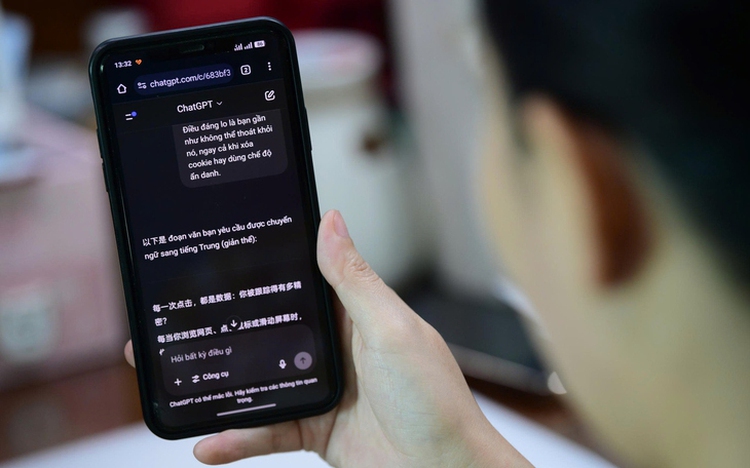
A person uses OpenAI’s ChatGPT tool to translate a Vietnamese sentence into Chinese. Photo: Quang Dinh / Tuoi Tre
Advanced AI interpretation tools—such as the real-time voice translation feature recently introduced by Google in Google Meet—help users in the Southeast Asian country communicate seamlessly across languages and reduce the reliance on interpreters, particularly at a low or even zero charge.
As a result, many organizations are now considering easing language proficiency requirements in their hiring process.
Tanca.io, a digital transformation startup which frequently holds meetings with international partners, used to face challenges due to the limited number of English-proficient staff.
According to its founder and chairman Tran Viet Quan, the firm had to hire professional interpreters for important meetings, which was costly, inconvenient, and time-consuming.
Now, AI-powered translation tools integrated by online meeting platforms have made life easier, he said.
For offline meetings, devices such as AI-enabled earbuds, like Google Pixel Buds, are able to offer direct translation.
Despite his strong English skills, the CEO of another tech company shared that he still relies on AI translation as his partners prefer communicating in their native languages.
“I found it fascinating because the AI assistant translated fairly well,” he remarked.
As per observations by Tuoi Tre (Youth) newspaper’s reporters, AI assistant tools now enable real-time conversational interpretation.
At the recent Google I/O 2025, Google introduced a real-time voice translation feature powered by a large audio language model from Google DeepMind.
While preserving the speaker’s original voice and tone, the tool allows users to speak naturally in their native language and their audience to listen in their own language.
Irreplaceable positions
Ton Quang Thanh, director of Quang Thanh Foreign Language Center in Ba Ria-Vung Tau Province, just outside Ho Chi Minh City, told Tuoi Tre that he was amazed after trying some AI technologies.
Thanh uses AI to develop lesson plans, hold one-on-one conversations, and personalize curricula for students.
Nonetheless, he said AI translation tools are incapable of replacing teachers or interpreters.
“Learning a language isn't just about basic communication; it's about understanding culture, building confidence, and mastering the language. However, as AI develops, learners have more opportunities to practice at lower costs,” he emphasized.
Hoang Huong, CEO of Unikon Vietnam, a technology firm specializing in AI content solutions, stated that advancements in AI—particularly large language models (LLMs), automatic speech recognition (ASR), and text-to-speech (TTS) technologies—have enabled machines to understand, translate, and respond in natural language with high accuracy.
“This progress presents challenges for roles like interpreters and foreign language teachers. However, it doesn't signal the end of language learning but hints at the need for educators to adapt,” Huong said.
Similarly, Tanca.io chairman Quan noted that despite remarkable progress, AI still has shortcomings in cultural understanding and complex fields like business and politics.


Max: 1500 characters
There are no comments yet. Be the first to comment.